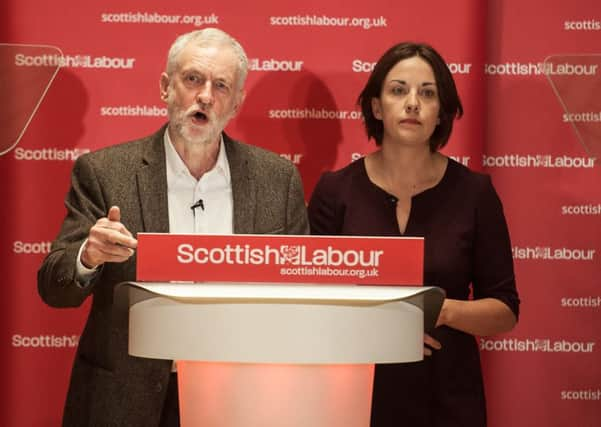Kezia Dugdale '˜hunted' by party's left, says Labour insiders


One senior party figure suggested Jeremy Corbyn could have done more to “call off the hounds” who demanded Ms Dugdale’s resignation until the final week of her leadership.
Concerns have also been raised that the coming leadership contest could turn into a divisive proxy war for control of the UK Labour National Executive Committee.
Advertisement
Hide AdAdvertisement
Hide AdBut supporters in the party said the Scottish Labour leader had quit in order to concentrate on “what really matters in life”, rather than caving into pressure from critics.
Despite making clear in her resignation statement that she was leaving for personal reasons, Ms Dugdale’s shock decision to resign two years and two weeks into her leadership has prompted renewed speculation about her relationship with Mr Corbyn and his supporters.
In last year’s leadership election, she endorsed Mr Corbyn’s challenger, claiming the Labour leader would leave his party “carping from the sidelines”.
The comments made Ms Dugdale a target, with a left-wing political journal renewing its attack over the summer.
“There was an element who harried and hassled her, around the Scottish Left Review in particular,” a senior insider said. “They hunted her unnecessarily.
“They are the self-appointed spokespeople of the far-left. They might be Corbynistas, but they’re certainly not officially sanctioned.”
The working relationship reached a low after Mr Corbyn was confirmed as Labour leader at the party’s conference in Liverpool a year ago.
Wielding a new mandate from party members, Mr Corbyn tried to block a long-planned autonomy package that was set to give seats on the party’s NEC to leaders from Scotland and Wales.
Advertisement
Hide AdAdvertisement
Hide AdOn multiple occasions Mr Corbyn and his union backers tried to use procedural rules to strike down reforms that would have seen Ms Dugdale and Welsh First Minister Carwyn Jones, another prominent critic, shifting the balance of power on the key decision-making body.
“I think whoever is the candidate of the left will not be his own man, and will be used by people, like the people who harried and hounded Kez,” the Labour source said. “A lot of people are urging that it is a short campaign, because it could get quite divisive.”
However, allies emphasised the personal nature of Ms Dugdale’s decision. Elected in 2007, she was immediately tagged as a rising star.
In an interview with the Edinburgh Evening News following the resignation of Johann Lamont as Scottish Labour leader, Ms Dugdale cemented her image as a reluctant leader.
“I know my strengths and my limits,” she told journalist Gina Davidson, who later became her director of policy. “I’m a sidekick, not the superhero.”
She was duly elected as sidekick to Jim Murphy, but after Labour’s near wipeout in 2015, Ms Dugdale became the only candidate to command widespread support and was thrust into the top job.
The past year has brought considerable personal anguish. In January, Ms Dugdale split from her fiancée and partner of nine years, Louise Riddell. And in February her close friend Gordon Aikman, a former Labour researcher and MND campaigner, died of his illness aged just 31.
In her resignation letter, Ms Dugdale said the example of his life taught her “never to waste a moment”.
Advertisement
Hide AdAdvertisement
Hide AdPitched into an unexpected general election campaign, pressure on Ms Dugdale built as Labour appeared to be heading for another terrible result, with some predicting they could lose their only seat in Scotland.
Another insider suggested the election weighed on the Scottish Labour leader, and that she may have begun considering her position during the campaign.
Labour’s surprise bounce-back, beating expectations to win seven seats, released much of that pressure and led to speculation that Labour’s surge under Mr Corbyn could revive the party and perhaps even carry Ms Dugdale to Bute House.
Coming so soon after the unexpected boost to party morale, the resignation was described as a “bolt from the blue” by one senior Labour staffer – but it was the timing, rather than the decision, that is a surprise.